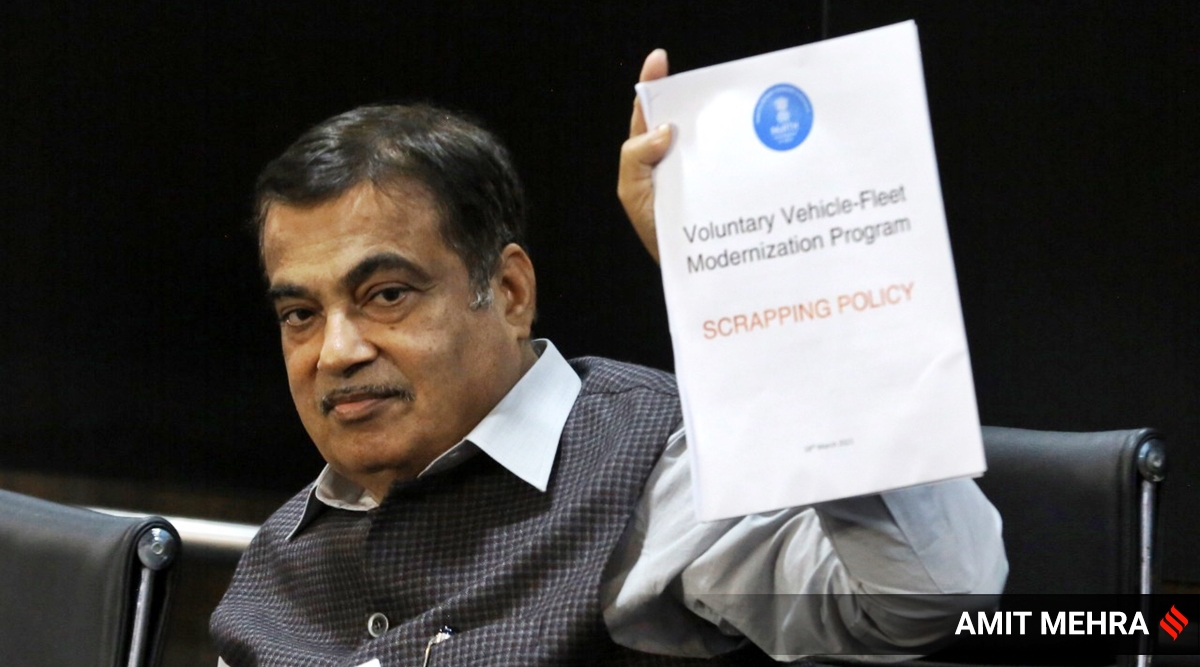
India will launch a new “ecosystem” of compulsory fitness testing of vehicles and ensure that those who do not register will be deregistered, according to the Union Minister for Road Transport and Highways, Nitin Gadkari. At the same time, he said, the government will approach automakers to consider a five percent discount on the purchase of new vehicles for those who give up their old vehicles for scrap metal, and will push for help on GST.
Announcing the “Voluntary Vehicle Fleet Modernization Program” in Lok Sabha on Thursday, Gadkari said that commercial vehicles over 15 years old and personal vehicles over 20 years old will be marked for scrapping if they fail the test. “They will be caught and destroyed,” he said.
Scrapping vehicles will reduce our dependence on imports and help us control the cost of materials. pic.twitter.com/sKHeF9Cruy
– Nitin Gadkari’s Office (@OfficeOfNG) March 18, 2021
The emphasis of the policy is on deregistering unfit vehicles by calling them “end of life”, while encouraging an environment conducive to such vehicles being renounced after the scrapping process.
The new regulatory regime, aimed primarily at cleaner emissions, fuel efficiency and better safety, will begin mandatory testing of heavy commercial vehicles from April 2023 and for other categories, on a staggered basis, from June 2024. .
It will enter into force earlier, as of April 2022, for vehicles owned by governments and allied entities such as PSU. In his case, Gadkari said, vehicles older than 15 years will be compulsorily scrapped, without any consideration of fitness; there are at least 2.37 lakhs of such vehicles, he said.
Vintage cars will be exempt from this policy, Gadkari said, adding that separate guidelines will be formulated to regulate them.
“The ecosystem is expected to attract additional investment of around 10 billion rupees and 35,000 job opportunities,” the minister said, adding that the new regime was adopted after studying similar efforts in countries such as Germany, the United Kingdom, the United States. and Japan.
Under the new policy, the Government will promote the establishment of integrated scrapping facilities – Registered Vehicle Scrapping Facilities (RVSF) – across India. Authorities said identified locations include Alang in Gujarat, where a highly specialized scrapping center is planned.
A key feature of the policy is a series of measures to push users towards the new system. “As a disincentive measure, the increased fees for the certificate of aptitude and the aptitude test may be applicable to commercial vehicles 15 years from the date of initial registration,” said Gadkari.
In a draft notice issued this week, it was proposed to increase the re-registration fees for all vehicles from eight to about 20 times, depending on the type of vehicle. These charges will take effect from October of this year.
On the other hand, the ministry will issue warnings to automakers to grant a five percent discount on new purchases after an old vehicle has been scrapped on the basis of a certificate. Gadkari is also pushing for a refund in GST. “I have asked the Minister of Finance to grant a reduction to the Central and State GST. The decision is entirely up to them, ”he said.
The Center has also advised states to grant refunds of up to 25 percent in road tax for newly purchased vehicles along with waiver of registration fees for those who submit scrap certificates. Officials expect the financial incentives to scrap and buy a new car far outweigh the running cost of, say, a 15-year-old personal vehicle. The government expects the value of scrap to be four to six percent of the price of a new vehicle.
Gadkari said the new rules will also apply in Delhi and the National Capital Region, where diesel vehicles over 10 years old and gasoline vehicles over 15 years old are banned following a 2015 ruling by the National Green Court.
“We will take a legal opinion on this matter as to whether a law passed by Parliament will prevail over the judgment of the court. In my opinion, it should. There are many such cases in the past. The basis of the scrapping policy is the amendments to the Motor Vehicles Act passed by Parliament. So this policy should also be applicable in Delhi, ”the minister told reporters later.
Gadkari said that this policy “is not a sanction for anyone.” “Something is said, like what the poor and the middle class will do (after scrapping their car). So the thing is, newer cars are better equipped with safety features and provide much better mileage. So it is a benefit for everyone, ”Gadkari told reporters. “It is not a policy against the poor. Everyone benefits from this. “
On Thursday night, the Ministry of Highway Transportation issued a draft notification of rules for the creation of an RVSF. Any legal entity can establish such a facility with a license valid for 10 years and renewable for 10 more. The processing fee for applications is Rs 1 lakh each along with a bank guarantee of Rs 10 lakh. The centers will be linked to police and national databases to track stolen vehicles or those linked to other criminal activities.
Likewise, the Government foresees the creation of Automated Fitness Centers through private participation. Officials said the goal is to have one in every district, or at least 718 of these centers across India.
The Ministry has sanctioned 26 model centers and asked states to allocate land for free to encourage private investors. These automated centers, with no planned human intervention in the testing process, will charge around 1,200 rupees for testing, authorities said.
According to data from the Ministry, India has 51 lakh of light motor vehicles that are over 20 years old and 34 lakh over 15 years old. Around 17 lakh of medium and heavy commercial vehicles are over 15 years old without valid certificates of fitness, according to the data.
.